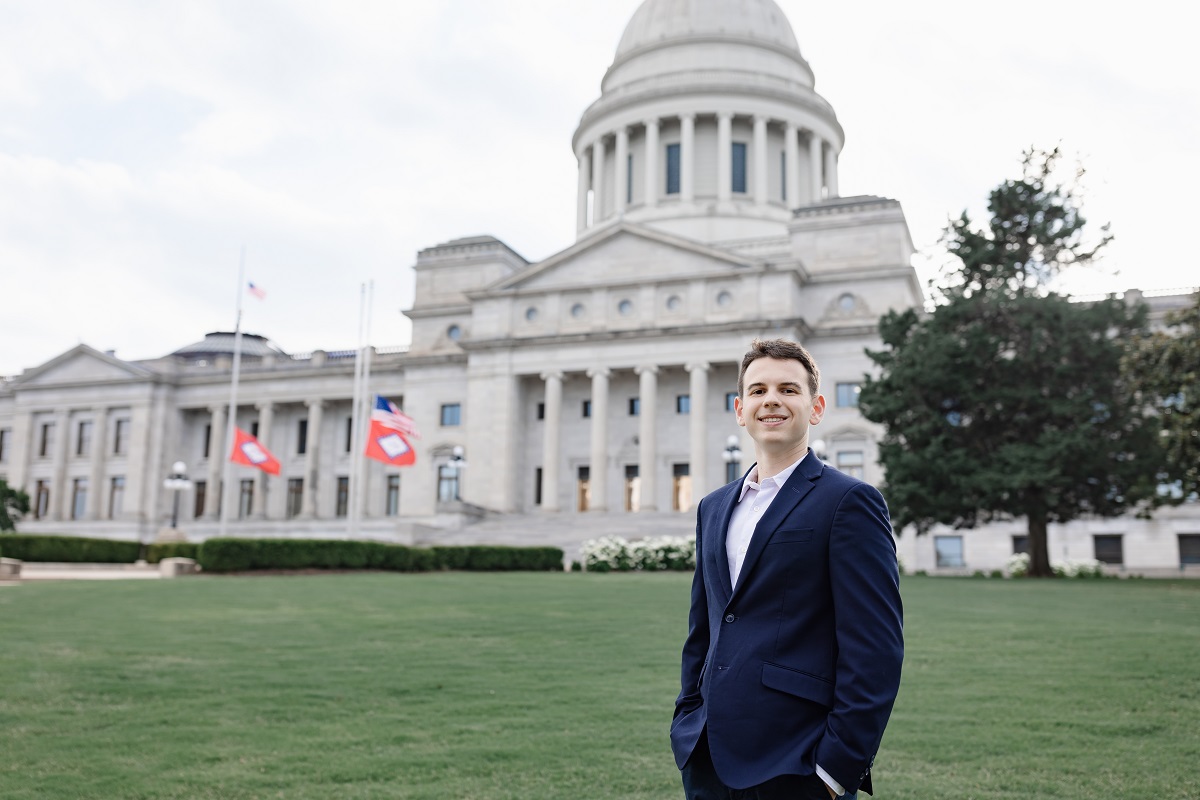As one of the only Jews in his high school in Little Rock, Arkansas, David Ronnel realized many of his classmates were ignorant about Jewish culture, religion and people — and worse.
“I had a lot of people assume things about me because of my religion, and I also faced a lot of antisemitism and hate speech,” said David, 19.
David decided he wanted to teach his schoolmates and other students in the state about Jews through Holocaust education, which he learned was particularly lacking in Arkansas.
A 2020 survey of Americans ages 18-39 by the Conference of Jewish Material Claims Against Germany found that Arkansans ranked last among Americans when it came to Holocaust knowledge. Only 17 percent of Arkansas respondents in that age cohort had “definitely heard” about the Holocaust; could name at least one concentration camp, death camp or ghetto; and knew that 6 million Jews were killed.
As he set about his project, David discovered that a group of Jews in the northwest region of Arkansas were advocating for legislation to require public school students from grades 5-12 to learn about the Holocaust. He soon got involved with the group, called the Holocaust Education Living Proposal (H.E.L.P.) committee, to help the bill get passed.
David started calling lawmakers and community leaders, became a spokesperson for the group, and testified before the State House and Senate education committees. He highlighted antisemitic incidents throughout Arkansas, such as the 2019 vandalism of a Hanukkah display in Hot Springs and the defacement of a Booneville business with swastikas and other Nazi graffiti. That same year, protesters bearing antisemitic signs, including one that read “The Holocaust didn’t happen, but it should have,” interrupted a Holocaust remembrance event in Russellville.
“The dwindling number of Holocaust survivors and World War II veterans, combined with the lack of Holocaust instruction in classrooms, has created a learning void that is eagerly filled today on social media,” David testified before the Arkansas State Senate. “Arkansas has a duty to teach the Holocaust so students are armed with facts and knowledge to combat the flood of misinformation and denials online.”
The legislature ultimately passed the bill unanimously, and in April 2021, Gov. Asa Hutchinson signed it into law.
“Today I signed SB160, an act to require Holocaust education be taught in all public schools,” Hutchison wrote on Instagram. “17-year-old David Ronnel testified in committee for this bill, and I was honored to sign this bill on #HolocaustRemembranceDay with David by my side.”
But that wasn’t enough. David went on to advocate successfully for a bill to establish an annual Holocaust Education Week in Arkansas public schools and helped found the Arkansas Holocaust Education Award Donation (AHEAD) Fund to award teachers for their efforts to teach students about the Holocaust.
In the first year of the new Holocaust education requirements, according to David, more than 500 schools established new Holocaust curricula and 300,000 high school students learned about the horrifying atrocities of the genocide.
David recently won an award of his own: a 2023 Diller Teen Tikkun Olam Award, given annually by the San Francisco-based Helen Diller Family Foundation to 15 teens nationwide who exemplify the Jewish value of tikkun olam, repairing the world. The prize includes a $36,000 award, which David said he plans to donate to the AHEAD Fund.
David said he ultimately hopes improved Holocaust education will lead to a better world.
“Holocaust education can be a great way, in a very broad sense, to combat hatred and bigotry —not just for Jewish people but people of all different backgrounds,” he said.
David said he finds inspiration for his work from his family’s own history. His paternal grandfather was born in a colony in Shanghai established by Jews fleeing the Russian revolution, immigrated to the United States and joined the Air Force. He met his future wife, a farmer’s daughter, while serving at a base in Mississippi. He eventually left the military, found a job at a scrapyard in Little Rock, and launched the metal recycling business that David’s father and uncle still operate today.
David grew up regularly attending his local synagogue, Temple B’nai Israel.
“I’m from a Reform family full of very opinionated, strong Southern Jewish men and women,” he said. “So growing up watching my family fight for the causes they cared about and show their passion behind tikkun olam really inspired me.”
Winning the Diller Tikkun Olam Award, he said, has been very meaningful.
“I feel so supported by my community and so incredibly honored to be part a part of an amazing cohort of Jewish teen leaders and changemakers,” David said.
Despite his success, David says that Arkansas — which only has about 2,000 Jews, among the least of U.S. states — “still has a little ways to go” when it comes to Holocaust education.
“But after this bill, I felt so empowered by my community’s ability to overcome hate,” said David, who recently started his freshman year at University of North Carolina at Chapel Hill. “Holocaust education isn’t just about fighting antisemitism. It’s about preserving history, and it’s about increasing tolerance in our communities.”
This article was sponsored by and produced in partnership with the Diller Teen Tikkun Olam Awards, which celebrate tikkun olam, or “repairing the world.” Each year, the Helen Diller Family Foundation recognizes up to 15 extraordinary Jewish teenagers from across the United States with an award of $36,000 each to honor their initiatives to help change the world. Nominate a young leader today or teens can apply directly by January 5, 2024.








